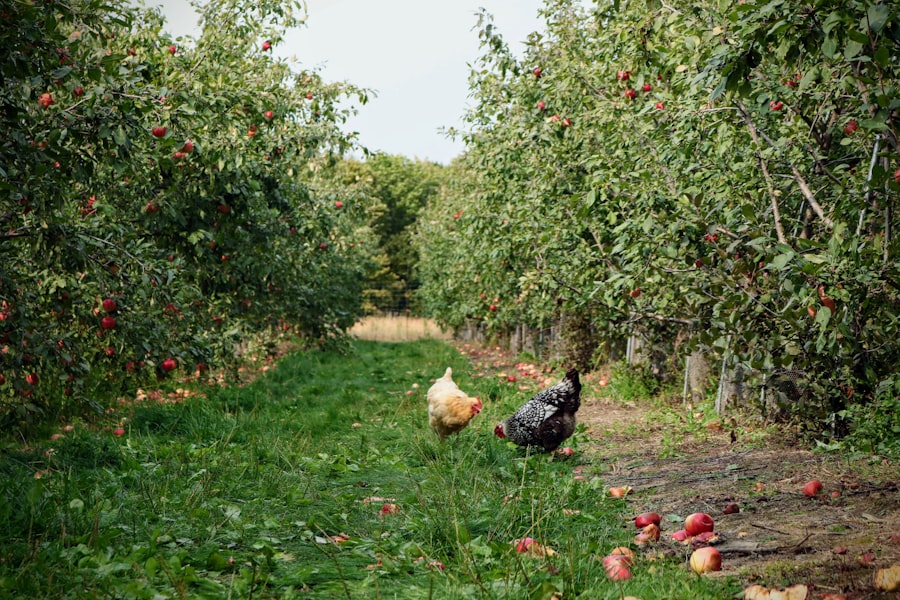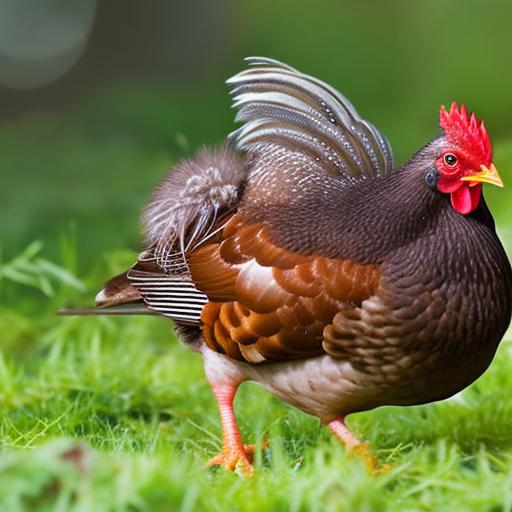Ticks are a common nuisance that can pose serious health risks to both humans and animals. These blood-sucking parasites can transmit a variety of diseases, including Lyme disease, Rocky Mountain spotted fever, and babesiosis. Tick prevention is crucial for the well-being of both humans and pets. While there are various methods to control ticks, one natural and effective solution is using chickens for tick control. Chickens have a voracious appetite for ticks and other insects, making them an excellent addition to any tick prevention strategy.
Key Takeaways
- Ticks can pose a serious threat to both humans and animals, as they can transmit diseases such as Lyme disease and Rocky Mountain spotted fever.
- Chickens are a natural and effective way to control tick populations, as they eat ticks and other insects that can carry diseases.
- When choosing chicken breeds for tick control, it’s important to consider factors such as temperament, hardiness, and egg-laying ability.
- Rhode Island Reds, Plymouth Rocks, Sussex, Australorps, and Wyandottes are all great breeds for tick control, each with their own unique characteristics.
- To set up the perfect chicken coop for tick control, make sure to provide plenty of space, shelter, and protection from predators, as well as a balanced diet and clean water.
Understanding Ticks and Their Dangers
Ticks are small arachnids that feed on the blood of mammals, birds, and reptiles. They are commonly found in wooded areas, tall grasses, and shrubs. Ticks can attach themselves to their hosts and feed for several days, during which they can transmit diseases. The most common diseases transmitted by ticks include Lyme disease, which can cause joint pain, fatigue, and neurological problems; Rocky Mountain spotted fever, which can cause fever, headache, and rash; and babesiosis, which can cause flu-like symptoms and anemia.
Ticks pose a significant threat to both humans and animals. In humans, tick-borne diseases can lead to long-term health complications if not treated promptly. In pets, ticks can cause similar diseases and also lead to anemia and skin infections. Therefore, it is crucial to implement effective tick prevention measures.
How Chickens Help Control Ticks
Chickens are natural predators of ticks and other insects. They have a keen eye for spotting small creatures on the ground and are quick to snatch them up. Chickens will actively hunt for ticks in grassy areas, reducing the tick population in their vicinity.
Using chickens for tick control has several benefits over traditional methods such as pesticides. Firstly, chickens provide a natural solution that does not involve the use of harmful chemicals. Pesticides can have adverse effects on the environment and may also pose risks to humans and animals. Secondly, chickens are a sustainable and cost-effective solution. Once you have established a flock of chickens, they will continue to provide tick control without the need for ongoing expenses. Lastly, chickens offer additional benefits such as fresh eggs and fertilizer for your garden.
Choosing the Right Breeds for Tick Control
Not all chicken breeds are equally effective at controlling ticks. Some breeds have a stronger instinct for hunting insects and are more active in their pursuit. When choosing chickens for tick control, it is important to consider their characteristics and behavior.
The ideal tick-controlling chicken breed should be active, alert, and have a strong foraging instinct. They should be able to cover a large area in search of ticks and other insects. Additionally, breeds that are known for their ability to fly or roost in trees can be particularly effective at targeting ticks in tall grasses and shrubs.
Rhode Island Red Chickens
Rhode Island Red chickens are a popular breed known for their hardiness and versatility. They have a strong foraging instinct and are excellent hunters of insects, including ticks. Rhode Island Reds are active birds that enjoy free-ranging and exploring their surroundings. They are also known for their ability to adapt to various climates, making them suitable for tick control in different regions.
Plymouth Rock Chickens

Plymouth Rock chickens, also known as Barred Rocks, are another breed that excels at tick control. They are medium-sized birds with a calm temperament and excellent foraging skills. Plymouth Rocks are known for their ability to adapt to different environments and climates, making them a versatile choice for tick control.
Sussex Chickens
Sussex chickens are a breed that combines beauty with practicality. They come in various colors and patterns, making them an attractive addition to any flock. Sussex chickens have a strong foraging instinct and are excellent hunters of ticks and other insects. They are also known for their friendly and docile nature, making them a great choice for families with children.
Australorp Chickens
Australorp chickens are a breed that originated in Australia and are known for their excellent egg-laying abilities. In addition to their egg production, Australorps are also effective tick hunters. They have a strong foraging instinct and are active birds that enjoy exploring their surroundings. Australorps are a hardy breed that can adapt to different climates, making them suitable for tick control in various regions.
Wyandotte Chickens
Wyandotte chickens are a breed known for their beautiful feather patterns and friendly temperament. They have a strong foraging instinct and are excellent hunters of ticks and other insects. Wyandottes are also known for their ability to adapt to different climates, making them a versatile choice for tick control.
Setting up the Perfect Chicken Coop for Tick Control
To maximize the effectiveness of using chickens for tick control, it is important to provide them with a well-designed chicken coop. A well-designed coop will not only keep your chickens safe but also encourage their natural hunting behavior.
When setting up a chicken coop for tick control, consider the following tips:
1. Provide ample space: Chickens need enough space to move around and hunt for insects. Ensure that your coop is large enough to accommodate your flock comfortably.
2. Include roosting areas: Chickens naturally roost in trees at night, so providing roosting areas in your coop will encourage their natural behavior.
3. Create access to the outdoors: Chickens should have access to an outdoor area where they can hunt for ticks and other insects. Consider using chicken wire or electric fencing to create a secure outdoor space.
4. Provide shade and shelter: Chickens need shade and shelter from the elements. Ensure that your coop has areas where chickens can seek shade and protection from rain or extreme temperatures.
5. Use natural materials: When building your coop, use natural materials such as wood and straw. Avoid using chemicals or treated materials that could be harmful to your chickens.
Using chickens for tick control is a natural and effective solution that offers numerous benefits. Chickens have a voracious appetite for ticks and other insects, making them excellent predators in the fight against tick-borne diseases. By choosing the right chicken breeds and providing a well-designed coop, you can create a tick-free environment for both humans and animals. Consider adding chickens to your tick prevention strategy and enjoy the benefits of a natural and sustainable solution.
Looking for the best chickens to keep ticks away? Check out this informative article on Poultry Wizard’s website. They provide valuable insights on how certain chicken breeds can help control tick populations in your backyard. Discover which chickens are most effective in reducing ticks and learn about their unique characteristics. To find out more, visit https://poultrywizard.com. While you’re there, don’t miss their other interesting articles like “The Chicken Coop Country Diner” (https://poultrywizard.com/keeping-chickens/the-chicken-coop-country-diner/) and “Do Quails Sit on Their Eggs?” (https://poultrywizard.com/breeding-quail/do-quails-sit-on-their-eggs/). Happy reading and happy chicken keeping!
FAQs
What are ticks?
Ticks are small, blood-sucking arachnids that can transmit diseases to humans and animals.
Why are chickens good for tick control?
Chickens are natural predators of ticks and can help control their population in your yard or garden.
What are the best chicken breeds for tick control?
The best chicken breeds for tick control are those that are active foragers and have a strong instinct to hunt and peck, such as Rhode Island Reds, Plymouth Rocks, and Sussex.
How many chickens do I need to control ticks?
The number of chickens you need to control ticks depends on the size of your yard or garden. As a general rule, you should have at least 4-6 chickens per 1,000 square feet of space.
Do I need to provide special care for chickens used for tick control?
Chickens used for tick control require the same care as any other backyard chicken. They need access to fresh water, a balanced diet, and a safe and secure coop.
Can chickens completely eliminate ticks from my yard?
While chickens can help control the tick population in your yard, they cannot completely eliminate them. It is important to use other tick control methods, such as landscaping and tick repellents, in conjunction with chicken foraging.
Meet Walter, the feathered-friend fanatic of Florida! Nestled in the sunshine state, Walter struts through life with his feathered companions, clucking his way to happiness. With a coop that’s fancier than a five-star hotel, he’s the Don Juan of the chicken world. When he’s not teaching his hens to do the cha-cha, you’ll find him in a heated debate with his prized rooster, Sir Clucks-a-Lot. Walter’s poultry passion is no yolk; he’s the sunny-side-up guy you never knew you needed in your flock of friends!







